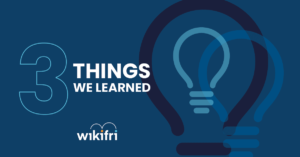
|
Hello Friends! This week we are following the Berkshire Hathaway annual meeting, Hippo results & earnings season winding down. Here are the three things we learned: |
[1] |
|
Updates from Capitalist Woodstock Berkshire Hathaway held their annual shareholder meeting last Saturday, often described as the ‘Capitalist’s Woodstock’. Since BH owns many insurance interests there were interesting comments from Mr. Buffet himself, his right hand man Charlie Munger and insurance chair Ajit Jain. Shareholders lined up outside the meeting, recognizing it could be one of their last chances to see Buffett and Munger. Jain’s stated that GEICO’s combined ratio of 93 is not a true indication of their profitability and full-year combined ratio will likely fall slightly below 100 falling short of the 96 target. Close to 90 percent of their new business leverages telematics in pricing decisions however less than half of the telematics input is being taken up by policy holders. GEICO’s technology needs improvement to make this work better, over 600 legacy systems do not communicate with each other. Buffet criticized public insurtechs stating ‘There have been a lot of public companies created in the last decade thereabouts in insurance, and there’s none of them that we would like to own, and they always started out in their prospectus saying ‘this is a tech company, not an insurance company’. Mr. Buffett went on to praise Berkshire Hathaway Specialty Insurance (BHSI) as a successful startup within the insurance industry, contrasting it with the public insurance companies that have reported significant losses. The meeting also touched on topics such as Elon Musk and Tesla, artificial intelligence, and the potential risks associated with advancing technologies like AI and the atom bomb. |
[2] |
|
Is It Time for Hippo Pivot? Hippo reported this week and after reading through their letter to shareholders, we were left with the question…Should they focus on fronting and create an MGA platform for specialty LOBs and pivot away from homeowners and less profitable lines at least until inflation and rates stabilize? Gross loss ratio for Hippo’s home insurance was 101%, including 41 percentage points of PCS-defined catastrophe losses. The company says that the quarter included unusually heavy rain and snow in parts of California, its second largest market. Net loss ratio was 273%, 23 points higher compared to Q1 2022. The company ended the quarter with a $69.8 million loss, compared to a loss of $66.5 million in Q1 2022. Hippo reported an adjusted EBITDA loss of $44.3 million for its home insurance program, and a $10.8 million loss for its insurance agency business. The fronting business was not in the red, recording an adjusted EBITDA of $3.2 million. Their cash and investments dropped $20 million to $620 million. Now that the 3 big public insurtechs have reported earnings it is clear that they must turn towards profitability or they may only last two more years. |
[3] |
|
Earnings Seasons Winds Downs Earning season is starting to wind down. There were less reports to read through this week. Liberty Mutual reported a net loss of $74 million in Q1 compared to net income of $498 million one year ago. Their combined ratio was 103.2%. Losses was primarily attributed to elevated catastrophe losses caused by the Midwest storms. They have been pushing for rate increases and achieved premium renewal rate increases of 12.8% in U.S. Personal Lines over the last 12 months. Though not public and required to report earnings cyber insurer Corvus put out a release touting their 36% loss ratio. Corvus achieved an 80% growth in cyber premiums in 2022 while maintaining the leading loss ratio. Improved scan technology enables Corvus to gain a clearer understanding of a company’s cyber exposure profile and make quick adjustments as needed. Cyber risk paired with innovative security technology continues to show promise and it appears larger carriers are taking notice and making further moves into this emerging risk. According to comments made during the ProAssurance earnings call the medical professional liability space is facing headwinds. MPL insurers are facing claims severity at or near all-time highs. The segment incurred an underwriting loss of $261 million during 2022, marking the eight consecutive year of underwriting losses. |
|
Thank you for following us, we appreciate your feedback and continued support. Stay productive, stay safe and stay in touch! |
